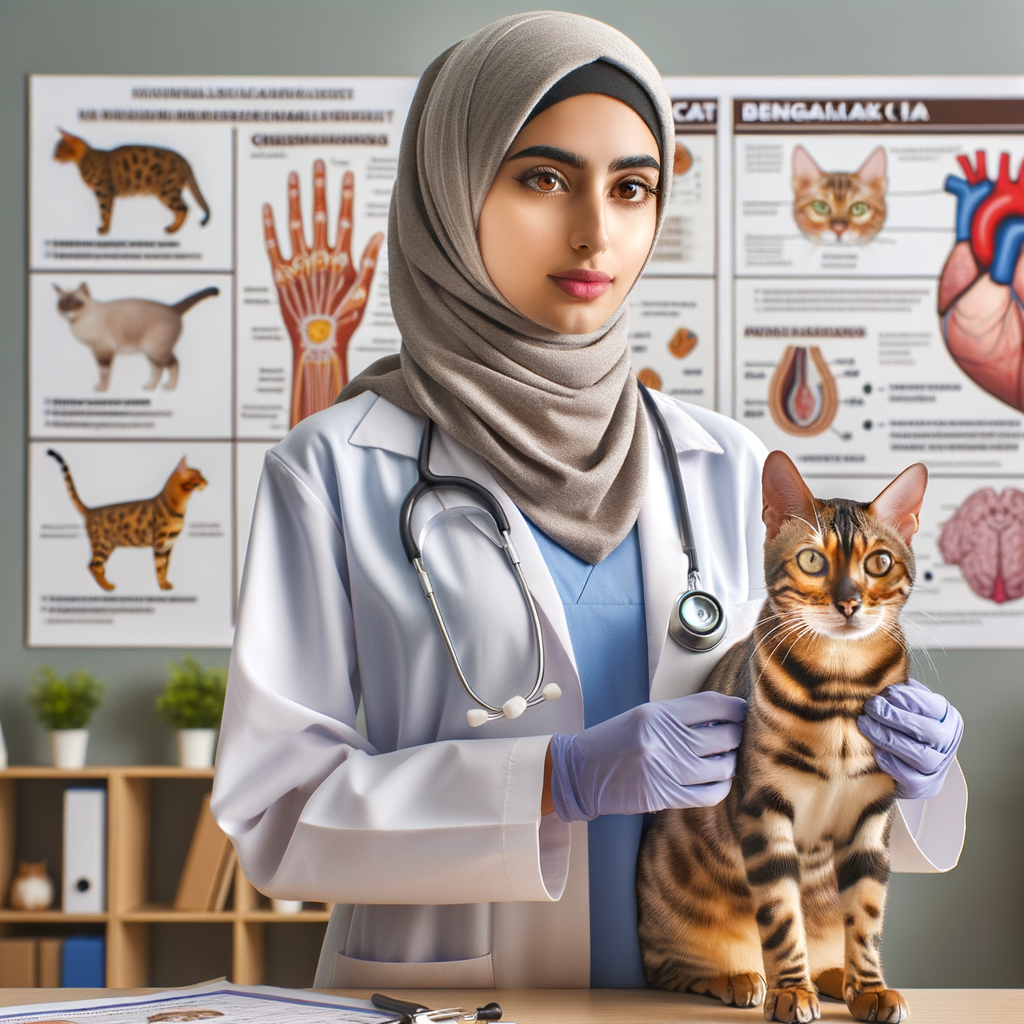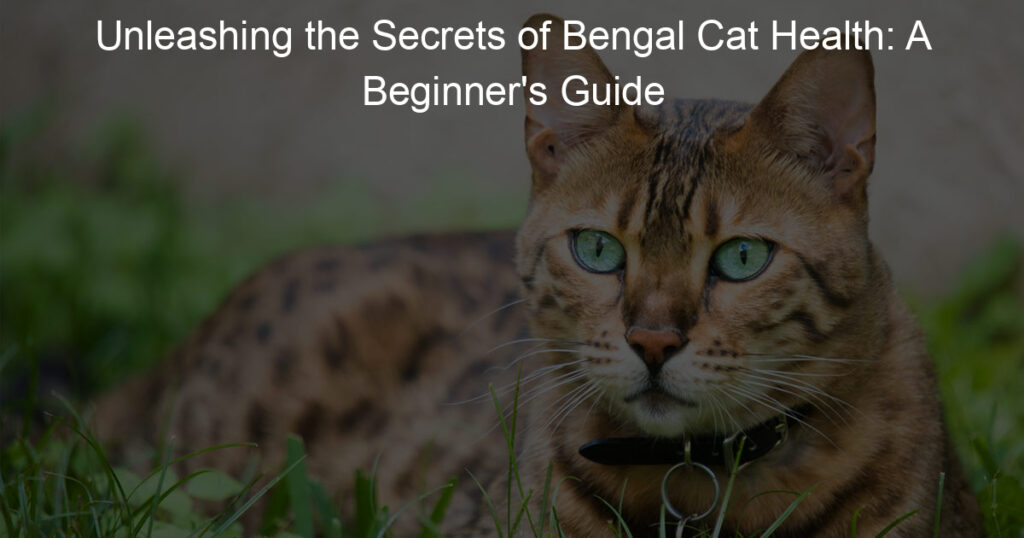
Understanding Bengal Cat Health
When it comes to Bengal cats, their health is paramount. These beautiful creatures are known for their distinctive coat and playful nature. However, like all pets, they require proper care and attention to maintain their health. In this section, we will delve into the world of Bengal cat health, discussing common health issues and the importance of regular health checks.
Bengal cats are generally healthy, but they can be prone to certain health conditions. Their lifespan typically ranges from 12 to 16 years. The key to a healthy Bengal cat is a balanced diet, regular exercise, and routine veterinary care. They are active and playful, which helps them maintain a healthy weight and good overall health.
-
Common Bengal Cat Health Issues
Despite their robust health, Bengal cats can suffer from certain health issues. These include:
- Progressive Retinal Atrophy (PRA): This is a genetic condition that can lead to blindness.
- Hypertrophic Cardiomyopathy (HCM): This is a heart disease that is unfortunately common in Bengal cats.
- Patellar Luxation: This is a condition where the knee cap moves out of its normal location, which can lead to lameness.
Being aware of these common health issues can help you spot any signs early and seek veterinary care promptly.
Regular health checks are crucial for Bengal cats. These checks can help detect any health issues early, which can lead to more effective treatment. It is recommended that Bengal cats have a health check at least once a year. During these checks, the vet will typically conduct a physical examination, take blood samples, and may also perform other tests such as x-rays or ultrasounds if needed.
In conclusion, understanding Bengal cat health is crucial for any Bengal cat owner. By being aware of common health issues and the importance of regular health checks, you can help ensure your Bengal cat lives a long and healthy life.
Bengal Cat Care: A Comprehensive Approach
When it comes to Bengal cat care, a comprehensive approach is essential. This includes not only providing a balanced diet and ensuring regular exercise, but also maintaining their health. Let’s delve into some key aspects of maintaining Bengal cat health.
Maintaining Bengal Cat Health
Health maintenance is a crucial part of Bengal cat care. Here are some key steps to ensure your Bengal cat stays healthy and happy.
- Regular Vet Visits
Regular vet visits are crucial for maintaining your Bengal cat’s health. These visits allow for early detection of any potential health issues. A routine check-up every 6 months is recommended. During these visits, the vet will check your cat’s weight, teeth, eyes, ears, and overall health.
- Importance of Vaccinations
Vaccinations play a vital role in protecting your Bengal cat from various diseases. Core vaccines for cats include Feline Panleukopenia (Feline Distemper), Feline Herpesvirus-1 (Feline Viral Rhinotracheitis), and Feline Calicivirus. Your vet can guide you on the appropriate vaccination schedule for your Bengal cat.
- Spaying/Neutering
Spaying or neutering your Bengal cat can prevent various health and behavioral issues. It can reduce the risk of certain cancers and prevent unwanted litters. It’s recommended to spay/neuter your cat between the ages of 4 to 6 months.
In conclusion, maintaining Bengal cat health involves regular vet visits, timely vaccinations, and spaying/neutering. By taking a comprehensive approach to Bengal cat care, you can ensure your feline friend leads a long, healthy, and happy life.
Bengal Cat Health Maintenance: Home Care
Home care is a crucial part of maintaining your Bengal cat’s health. It involves grooming, exercise, and mental stimulation. Let’s delve into these aspects:
- Grooming TechniquesGrooming your Bengal cat is not just about keeping them looking good, but it’s also about their health. Regular grooming can help prevent skin conditions and detect any abnormalities early. Bengal cats have a short, pelt-like coat that requires minimal grooming. Brushing their coat once a week with a soft brush can help remove loose hair and distribute skin oils, keeping their coat shiny and healthy. Regularly check their ears for any signs of infection or mites, and clean them gently with a pet-safe ear cleaner. Dental hygiene is also important. Brush their teeth regularly with a cat-friendly toothpaste to prevent dental diseases.
- Exercise and PlayBengal cats are known for their high energy levels and need for physical activity. Regular exercise helps keep your Bengal cat physically fit and prevents obesity, a common health issue in cats. Interactive toys, climbing trees, and play sessions can provide the necessary exercise. Remember, playtime is not just about physical exercise; it’s also a bonding time for you and your cat.
- Mental StimulationMental stimulation is as important as physical exercise in Bengal cats. They are intelligent and curious animals that need mental challenges to keep them happy and prevent behavior problems. Puzzle toys, training sessions, and interactive games can provide the mental stimulation they need. A mentally stimulated Bengal cat is a happy and healthy cat.
In conclusion, home care plays a significant role in maintaining your Bengal cat’s health. Regular grooming, sufficient exercise, and mental stimulation can keep your Bengal cat happy and healthy. Remember, a healthy cat is a happy cat.
Bengal Cat Diet: Key to Health
The diet of a Bengal cat plays a pivotal role in its overall health and well-being. By understanding their dietary needs, you can ensure they live a long, healthy, and happy life.
Understanding Bengal Cat Diet Needs
Bengal cats have specific dietary needs that are essential for their health. Here are the three key components of a Bengal cat’s diet:
-
- Protein Requirements
Bengal cats are carnivores by nature. This means they require a diet rich in animal protein. According to studies, a Bengal cat’s diet should consist of at least 40% protein. This can come from sources like chicken, fish, or beef. Protein helps in muscle development and provides them with the necessary energy for their active lifestyle.
-
- Hydration
Hydration is crucial for Bengal cats. They need to drink plenty of water to keep their kidneys healthy and prevent urinary tract issues. Providing a water fountain can encourage them to drink more water. Wet food can also contribute to their hydration as it contains up to 80% water.
-
- Supplements
While a balanced diet should provide all the necessary nutrients, sometimes supplements may be needed. Essential fatty acids, like Omega-3 and Omega-6, are beneficial for their skin and coat health. Vitamins A, E, and C support their immune system. However, always consult with a vet before adding any supplements to your Bengal cat’s diet.
Understanding these dietary needs is the first step towards ensuring your Bengal cat’s health. Remember, a balanced diet is a key to a healthy and happy Bengal cat.
Common Bengal Cat Diet Mistakes
When it comes to the health and happiness of your Bengal cat, diet plays a crucial role. However, there are some common mistakes that cat owners often make. Let’s take a closer look at these mistakes and how to avoid them.
-
- Overfeeding
Overfeeding is a common issue among Bengal cat owners. It’s easy to overestimate how much food your cat needs, especially if they’re always begging for more. However, overfeeding can lead to obesity, which can cause a host of health problems, including diabetes and heart disease. It’s important to follow the feeding guidelines provided by your vet or the food manufacturer.
-
- Feeding the Wrong Foods
Not all foods are suitable for Bengal cats. Some human foods can be toxic to cats, such as chocolate, onions, and grapes. Even some types of cat food can be unhealthy if they’re high in carbohydrates and low in protein. Bengal cats require a diet high in protein, so it’s important to choose a cat food that meets this requirement.
-
- Not Providing Enough Variety
Bengal cats, like humans, enjoy variety in their diet. Feeding your cat the same food every day can lead to boredom and a lack of interest in eating. It can also lead to nutritional deficiencies if the food you’re feeding doesn’t provide a complete and balanced diet. Try to mix things up by offering different types of high-quality cat food, and consider adding in some safe, cat-friendly human foods for variety.
In conclusion, by avoiding these common diet mistakes, you can help ensure that your Bengal cat stays healthy and happy. Remember, a balanced diet is key to a long and fulfilling life for your feline friend.
Bengal Cat Health Problems: Prevention and Treatment
When it comes to Bengal cats, they are generally healthy, but like any breed, they can be susceptible to certain health problems. Let’s take a look at some of the most common health issues Bengal cats may face and how we can prevent and treat them.
Common Bengal Cat Health Problems
While every Bengal cat is unique, there are a few health problems that are more common in this breed. Here are the top three:
- Genetic Disorders
Bengal cats can sometimes be prone to certain genetic disorders. These include polycystic kidney disease (PKD), which can cause kidney failure, and hypertrophic cardiomyopathy (HCM), a heart condition. Regular vet check-ups can help detect these conditions early.
- Dental Disease
Like all cats, Bengals can suffer from dental disease. This can lead to painful gums and tooth loss if not treated. Regular brushing and dental check-ups can help prevent this.
- Obesity
Obesity is a common problem in all domestic cats, including Bengals. Overfeeding and lack of exercise can lead to weight gain, which can cause a host of other health problems. A balanced diet and regular play can help keep your Bengal at a healthy weight.
Understanding these common health problems can help you keep an eye out for any signs or symptoms. Early detection and treatment can make a big difference in your Bengal’s health and happiness.
Remember, while this list covers some of the most common health problems, it’s not exhaustive. Regular vet check-ups are essential to catch any potential issues early. Your vet can provide personalized advice based on your Bengal’s age, weight, and overall health.
Preventing Bengal Cat Health Problems
Preventing health problems in your Bengal cat is an essential part of their care. By taking proactive steps, you can ensure your feline friend stays healthy and happy. Here are some key strategies:
-
- Regular Vet Check-ups
Regular vet check-ups are crucial for your Bengal cat’s health. These check-ups can help detect any potential health issues early, making them easier to treat. Your vet can also provide vaccinations, deworming, and other preventive treatments. According to the American Veterinary Medical Association, adult cats should have at least one vet visit per year, while kittens and senior cats may need more frequent check-ups.
-
- Proper Diet and Exercise
A balanced diet and regular exercise are vital for your Bengal cat’s health. Bengal cats are active and energetic, so they need a diet rich in protein to support their energy levels. Regular playtime and exercise can help prevent obesity, a common health problem among cats. A study by the Association for Pet Obesity Prevention found that over 60% of cats in the U.S. are overweight or obese, which can lead to serious health issues like diabetes and heart disease.
-
- Oral Hygiene
Oral hygiene is often overlooked but is crucial for preventing dental disease in Bengal cats. Regular brushing can help remove plaque and prevent tartar buildup. According to the American Veterinary Dental College, most cats show signs of dental disease by the age of three, so it’s important to start oral care early. Your vet can show you how to brush your cat’s teeth and recommend suitable products.
Remember, prevention is always better than cure. By following these steps, you can help ensure your Bengal cat lives a long, healthy, and happy life.
Bengal Cat Health Tips: Ensuring a Long and Happy Life
As a Bengal cat owner, your primary goal is to ensure that your feline friend leads a long and happy life. This involves understanding and implementing the best health practices. Here are the top three health tips for Bengal cats:
Top Bengal Cat Health Tips
-
- Regular Vet Visits
Regular vet visits are crucial for maintaining your Bengal cat’s health. These visits allow for early detection of potential health issues, ensuring that your cat gets the necessary treatment promptly. It’s recommended to have at least one vet check-up per year, but kittens or senior cats may require more frequent visits.
-
- Proper Nutrition
Proper nutrition is the cornerstone of a Bengal cat’s health. A balanced diet rich in proteins, vitamins, and minerals is essential for your cat’s overall well-being. Remember, Bengal cats are carnivores, so their diet should primarily consist of high-quality meat. Always consult with your vet to determine the best diet plan for your cat.
-
- Regular Exercise and Mental Stimulation
Bengal cats are known for their high energy levels and intelligence. Regular exercise and mental stimulation are vital to keep them healthy and happy. Engage your cat in interactive play sessions, provide them with puzzle toys, and ensure they have access to climbing trees or scratching posts. This not only keeps them physically fit but also helps to prevent behavioral issues.
By following these tips, you can ensure that your Bengal cat enjoys a long, healthy, and happy life. Remember, every cat is unique, so it’s important to tailor these tips to suit your cat’s specific needs and preferences.
Case Study: Bengal Cat Health Success Story
- Background of the Bengal Cat: The Bengal cat is a unique breed, known for its wild, leopard-like appearance and playful nature. This breed was created by crossing an Asian Leopard Cat with a domestic cat, resulting in a stunning and energetic pet. Despite their exotic looks, Bengals are full of affection and make great companions.
- Health Challenges Faced: Our case study involves a Bengal cat named Leo. Leo was facing several health issues, including obesity, dental problems, and a lack of energy. These health challenges were affecting Leo’s quality of life and causing concern for his owners.
- Steps Taken for Improvement: Leo’s owners took several steps to improve his health. They consulted with a vet who specialized in Bengal cats and implemented a new diet plan. This included high-quality, grain-free cat food and plenty of fresh water. They also introduced regular exercise into Leo’s routine, including play sessions and walks. Regular vet visits were scheduled to monitor Leo’s progress and adjust his care plan as needed.
- Outcome and Key Takeaways: After several months, there was a significant improvement in Leo’s health. He lost weight, his dental health improved, and he regained his energy. The key takeaways from Leo’s story are the importance of a proper diet, regular exercise, and routine vet visits for Bengal cats. This case study highlights that with the right care and attention, health issues in Bengal cats can be effectively managed.














